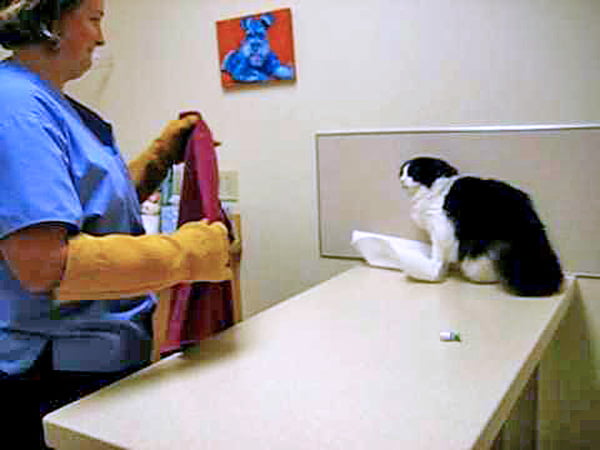
Here are 14 links between stress in domestic cats and health implications:
- Stressful events for whatever reason including emotional upsets can activate hookworm larvae lying dormant in a cat’s tissues. This results in the appearance of eggs in their stool.
- Before deworming a kitten, it is advisable to remove from their environment stressful conditions such as chilling, close confinement, a sudden change in diet or overfeeding. Kittens suffering from an ascarid infestation should be dewormed at 2 to 3 weeks of age and again at 5 to 6 weeks.
- Stress can cause rapid breathing as can pain, fever or overheating. Shock, dehydration, anaemia, lung disease, heart disease and a buildup of acid or toxic substances in the blood can also cause rapid breathing.
- Cats with heart failure should avoid stress because from a medical standpoint they are fragile cats. Heart failure is the inability of the heart to pump enough blood around the body to provide adequate circulation to meet the cat’s needs. The cause is a weakened or damaged heart muscle. Other organs become affected because of a lack of oxygen.
- Feline lower urinary tract disease can occur when there is no bacterial infection i.e. a negative bacterial culture. Feline idiopathic cystitis is cystitis without a known cause and when stress can play a role. Painful urination (dysuria) can flareup due to emotional or physical upheavals causing stress in the household.
- A little more about cystitis because it is the major feline disease associated with stress. It is often mentioned on veterinarian’s websites. Cystitis is an inflammation of the bladder and as part of the feline lower urinary tract disease complex. It can be caused by, as mentioned, bacterial infections as well as stones, and tumours. But it may be idiopathic and in which case stress appears to be a major factor. It is very similar to the interstitial cystitis condition in people. Obviously one element of the list of things one can do to prevent cystitis is to minimise stress as much as possible.
- Grooming can be a response to stress in a cat. Over-grooming causing a symmetrical balding of the cat in areas that are easy to get at can be caused by chronic stress. Grooming alleviates stress in a cat. Although feline endocrine alopecia can be caused, it is believed, by a hormone deficiency, stress may play a role. This kind of grooming is not caused by itching.
- Feline viral rhinotracheitis (FVR) is a viral infection which lives and multiplies in the cells lining the throat. During periods of stress including stress caused by an emotional response, the cat’s immunity system breaks down and the virus is shed into mouth secretions. At this time the cat may show signs of a mild upper respiratory illness.
- Environmental stresses and physical stresses lower a cat’s immunity and increase their susceptibility to feline infectious peritonitis (FIP).
- Along the same lines, environmental stresses including stress due to overcrowding and poor sanitation can play a role in weakening a cat’s immune system and therefore weakening their resistance to the feline leukaemia virus (FeLV).
- There are many reasons why a vaccine might fail one of which is improper handling and storage or incorrect administration but another is a cat being in a run-down condition or suffering from an illness that stresses their immune system.
- Stress can manifest itself in a well-known behavioural problem which is inappropriate urination or going to the toilet outside the litter box. Under these circumstances stress may be due to something as simple as a change in their routines and living patterns. Going to the toilet outside the litter box should never be a punishable “offence”. Look behind the behaviour for the reason. One typical reason is separation anxiety.
- Anxiety causes stress and anxiety can be shown in many ways. It is in a sense a mental health issue and a cat may become destructive when overly anxious or, as mentioned, over-groom or vocalise for hours or even become aggressive. Some cats become clingy and very possessive of their human companion.
- A queen’s normal maternal behaviour can be upset and adversely affected by stress caused by excessive noise or too much handling of her kittens by, for example, children or people who are unfamiliar to the queen. For the sake of clarity, the term “queen” refers to the breeding mother of kittens.

Sources: Various including Cat Owner’s Home Veterinary Handbook (multiple pages).
SOME MORE ON STRESS:


If trouble has happened to your animals and they are stressed, then this is quite normal because animals, like people, can experience stress. When I was under a lot of pressure, I took CBD, but then I decided to look at the website where I order my products all the time https://www.cornbreadhemp.com/ and I found out that there are products for animals there as well. I ordered it and I want to say that my cat’s condition has improved. That is, it works not only on humans but also on animals.